#U.S. Paratroopers
Text
youtube
#youtube#militarytraining#Combat Readiness#Troop Deployment#Parachute Regiment#War Games#Infantry Unit#Military Maneuvers#Military Training#Military Drills#Live Fire Exercise#Battle Simulation#Military Operations#Army Drill#Paratrooper Training#Soldier Skills#Airborne Division#Combat Training#Military Exercise#Tactical Warfare#U.S. Paratroopers#U.S. Army#Germany#Firepower Display#Tactical Maneuvers#Airborne Assault#Combat Drills#Target Practice#Infantry Training
2 notes
·
View notes
Text


#shirtless#muscle#jock#military jock#military#us military#u.s. military#us armed forces#us army#army#soldier#american soldier#paratrooper#82d airborne#guy taking selfie#mirror#scruff#facial scruff#shoulders#washboard abs#v lines#adonis belt#male navel#sexy navel#uniform#military uniform#enlarged 4x#photo enlargement#photo enhancement#color correction
153 notes
·
View notes
Video
#Paratrooper#U.S. Army Civil Affairs and Psychological Operations Command (Ai#U.S. Army Reserve#UH-60 Black Hawk#USACAPOC(A)#airborne#U.S. Army Civil Affairs and Psychological Operations Command (Airborne)#flickr
6 notes
·
View notes
Text

Members of the French Resistance discuss the military situation with paratroopers of the U.S. 82nd Airborne Division during the Battle of Normandy, June 1944. Photo credit: U.S. Army Signal Corps / Regional Council of Basse-Normandie / National Archives USA.
#history#military history#WW2#WWII#World War Two#Second World War#D-Day#Normandy Landings#French Resistance#photography#lest we forget
259 notes
·
View notes
Photo



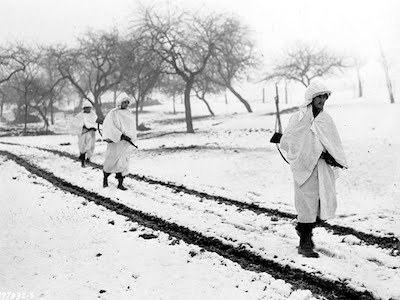

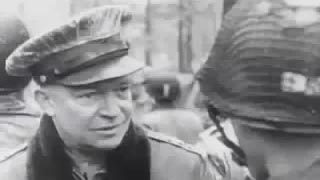
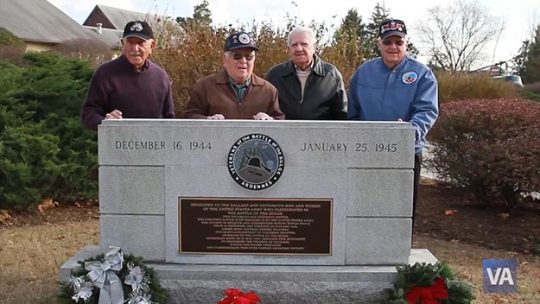
Early on the misty winter morning of Dec. 16, 1944, more than 200,000 German troops and nearly 1,000 tanks launched Adolf Hitler's last bid to reverse the ebb in his fortunes that had begun when Allied troops landed in France on D-Day. Seeking to drive to the coast of the English Channel and split the Allied armies as they had done in May 1940, the Germans struck in the Ardennes Forest, a 75-mile stretch of the front characterized by dense woods and few roads, held by four inexperienced and battle-worn American divisions stationed there for rest and seasoning.
After a day of hard fighting, the Germans broke through the American front, surrounding most of an infantry division, seizing key crossroads, and advancing their spearheads toward the Meuse River, creating the projection that gave the battle its name.
Stories spread of the massacre of Soldiers and civilians at Malmedy and Stavelot, of paratroopers dropping behind the lines, and of English-speaking German soldiers, disguised as Americans, capturing critical bridges, cutting communications lines, and spreading rumors. For those who had lived through 1940, the picture was all too familiar. Belgian townspeople put away their Allied flags and brought out their swastikas. Police in Paris enforced an all-night curfew. British veterans waited nervously to see how the Americans would react to a full-scale German offensive, and British generals quietly acted to safeguard the Meuse River's crossings. Even American civilians, who had thought final victory was near were sobered by the Nazi onslaught.
But this was not 1940. The supreme Allied commander, Gen. Dwight D. Eisenhower rushed reinforcements to hold the shoulders of the German penetration. Within days, Lt. Gen. George S. Patton Jr. had turned his Third U.S. Army to the north and was counterattacking against the German flank. But the story of the Battle of the Bulge is above all the story of American Soldiers. Often isolated and unaware of the overall picture, they did their part to slow the Nazi advance, whether by delaying armored spearheads with obstinate defenses of vital crossroads, moving or burning critical gasoline stocks to keep them from the fuel-hungry German tanks, or coming up with questions on arcane Americana to stump possible Nazi infiltrators.
At the critical road junctions of St. Vith and Bastogne, American tankers and paratroopers fought off repeated attacks, and when the acting commander of the 101st Airborne Division in Bastogne was summoned by his German adversary to surrender, he simply responded, "Nuts!"
Within days, Patton's Third Army had relieved Bastogne, and to the north, the 2nd U.S. Armored Division stopped enemy tanks short of the Meuse River on Christmas. Through January, American troops, often wading through deep snow drifts, attacked the sides of the shrinking bulge until they had restored the front and set the stage for the final drive to victory.
Never again would Hitler be able to launch an offensive in the west on such a scale. An admiring British Prime Minister Sir Winston Churchill stated, "This is undoubtedly the greatest American battle of the war and will, I believe, be regarded as an ever-famous American victory." Indeed, in terms of participation and losses, the Battle of the Bulge is arguably the greatest battle in American military history.
(via Battle of the Bulge | The U.S. Army)
47 notes
·
View notes
Text
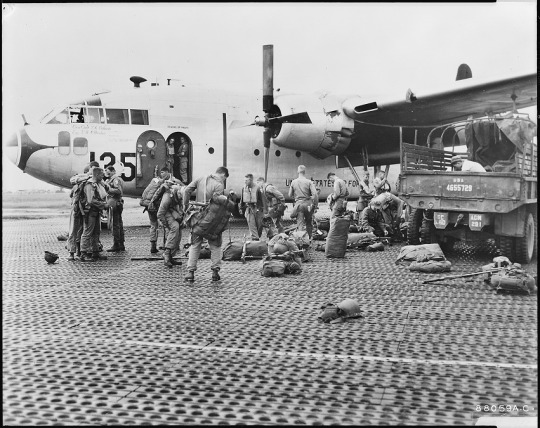
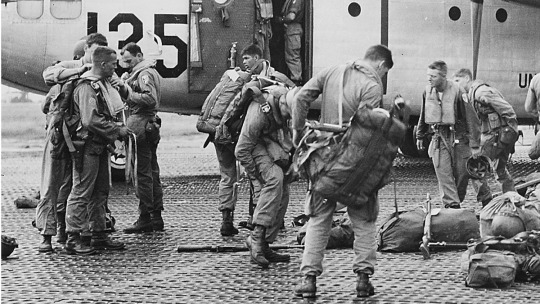
Paratroopers of the 187th Regimental Combat Team put on parachutes and "Mae West" life preservers before boarding a C-119 "Flying Boxcar," en route to Korea from southern Japan, on July 2, 1953.
Record Group 342: Records of U.S. Air Force Commands, Activities, and Organizations
Series: Black and White Photographs of U.S. Air Force and Predecessors' Activities, Facilities, and Personnel, Domestic and Foreign
Image description: 13 men are outdoors, next to a C-119 airplane. They are all in various stages of putting on parachutes, life preservers, and other equipment. Nearby is a truck with an open bed.
Image description: Zoomed-in portion of previous photo, showing the men in more detail. One is helping another fasten his life preserver around his neck; another is buckling a strap around his leg; another is lifting up a packed parachute to sling on his back.
71 notes
·
View notes
Text
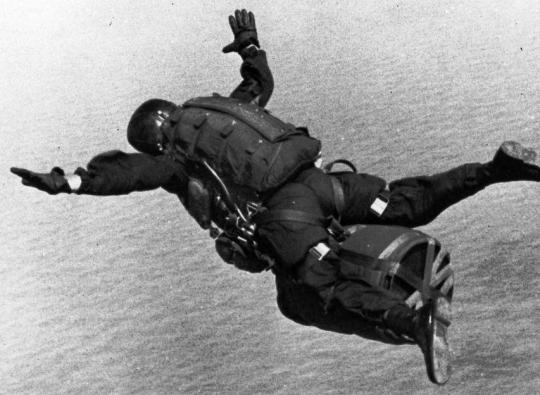
A U.S. Army Special Forces paratrooper conducts a HALO freefall jump with an MK–54 SADM (Special Atomic Demolition Munition)
40 notes
·
View notes
Text
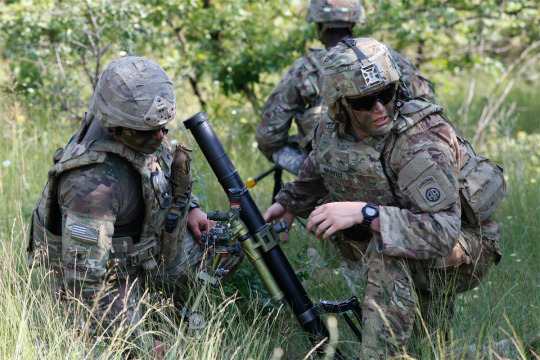
U.S. Army paratroopers during multinational exercise Swift Response 19 in Novo Selo Training Area, Bulgaria.
The U.S. Army photo by Spc. Justin W. Stafford (2019).
#army#military#us army#us military#armed forces#marines#usmc#us navy#us marines#military life#infantry#army strong#troops#veteran#soldier#marine#patriot#operator#combat#paratroopers#tactical#tactical gear#tacticool#training#exercise#strong europe#swift response#82nd airborne division#bulgaria#military 1st
47 notes
·
View notes
Text


⁎⁺ #𝙼𝙰𝚂𝙻𝙴𝚈𝚂 ⁺⁎ a deconstruction of the prototypical all-american boy next door : a study in loyalty turned lethal, rotting optimism, and the ghost left in the rubble of his expectations. a dependent muse affiliated with classcursehq. as written by august — xxiv. she/her. est. ★
⌞ 𝙿𝙸𝙽𝚃𝙴𝚁𝙴𝚂𝚃 ⌝ ⌞ 𝙿𝙻𝙰𝚈𝙻𝙸𝚂𝚃 ⌝ ⌞ 𝚂𝚃𝙰𝚁𝚃𝙴𝚁𝚂 ⌝ ⌞ 𝙴𝙳𝙸𝚃𝚂 ⌝ ⌞ 𝚃𝙰𝚂𝙺𝚂 ⌝

✩ 𝙱𝙰𝚂𝙸𝙲 𝙸𝙽𝙵𝙾𝚁𝙼𝙰𝚃𝙸𝙾𝙽 . . .
+ 𝙵𝚄𝙻𝙻 𝙽𝙰𝙼𝙴 peter rhys masley
+ 𝙽𝙸𝙲𝙺𝙽𝙰𝙼𝙴𝚂 his former teammates / colleagues from the army often refer to him simply as ' masley ' or ' mas '
+ 𝙳.𝙾.𝙱. 03 / 02 / 1996
+ 𝙰𝙶𝙴 twenty-eight
+ 𝙰𝚂𝚃𝚁𝙾𝙻𝙾𝙶𝚈 pisces sun / aries moon / aries rising
+ 𝙶𝙴𝙽𝙳𝙴𝚁 cis man
+ 𝙿𝚁𝙾𝙽𝙾𝚄𝙽𝚂 he / him / his
+ 𝙵𝙰𝙲𝙴𝙲𝙻𝙰𝙸𝙼 george mackay
+ 𝙾𝙲𝙲𝚄𝙿𝙰𝚃𝙸𝙾𝙽 former paratrooper in the u.s. army, current little league soccer coach / student at lincoln community college
+ 𝙵𝙾𝚁𝙼𝙴𝚁 𝙶𝚁𝙾𝚄𝙿𝚂 soccer team ( captain ), track team
+ 𝙼𝙱𝚃𝙸 𝚃𝚈𝙿𝙴 enfp : the champion
+ 𝙴𝙽𝙽𝙴𝙰𝙶𝚁𝙰𝙼 6w7 : the confidant
+ 𝙰𝙻𝙸𝙶𝙽𝙼𝙴𝙽𝚃 neutral good
+ 𝚃𝙴𝙼𝙿𝙴𝚁𝙰𝙼𝙴𝙽𝚃 phlegmatic
+ 𝚃𝚁𝙾𝙿𝙴 the boy next door
+ 𝙿𝙾𝚂𝙸𝚃𝙸𝚅𝙴 valiant, loyal, genuine, strong-willed, reliable, pragmatic
+ 𝙽𝙴𝙶𝙰𝚃𝙸𝚅𝙴 impressionable, impulsive, clumsy, irascible, stubborn, insecure
+ 𝙻𝙸𝙺𝙴𝚂 playing guitar, listening to music, comic books, video games
+ 𝙳𝙸𝚂𝙻𝙸𝙺𝙴𝚂 tba

✩ 𝙱𝙸𝙾𝙶𝚁𝙰𝙿𝙷𝚈 . . .
tw : mentions of death, grief, ptsd, explosion
on the day peter masley was born, the skies opened up, drenching lincoln city with relentless rain for seventeen hours straight. floods ravaged the small town, its streets filled not with the usual yellow school buses or pickup trucks, but rather rainwater spilling onto the pavement and through basements. nearby creeks overflowed, the occasional roar of thunder tearing through the sky with what felt like god's fury. even the most well-off neighborhoods were met with widespread power outages — yet none of this halted the masley family, rushing themselves fervently to st. mary hospital to await the arrival of their new baby.
peter wasn't quite what they expected. those familiar with the masleys knew of their yearning for a daughter, a desire expressed through occasional purchases of pink dresses and hair bows in hopes of manifesting this dream. with his bright blue eyes and dimpled smile, peter is a proper surprise — but he's theirs, and they love him, despite their unfulfilled wishes. despite, despite, despite.
growing up in lincoln city's suburbia, peter was accustomed to the earthy hues of forest green trees and brown muddy tire tracks. he was forged from this — a childhood of bittersweet faith and mornings shrouded in that dreaded oregon fog and rain he could never seem to escape. at age seven, he was the youngest of three masley boys. he had to fight fiercely to keep up with his older brothers, though he never quite found himself in the lead of their races.
though he adored his brothers, the golden-hearted boy was often wracked with tears of sensitivity in response to his brothers' harshness. there was a constant gray cloud hanging over his head, peter often overwhelmed with feelings of inadequacy and fear of his inability to live up to the expectations set by his brothers. he had a knack for falling into a trap of convincing himself he was merely an albatross — useless, unwanted, a burden of emotions he could hardly allow himself to feel and release. still, he was nurtured with notions to always do the right thing, to remain steadfast in his loyalty toward others, and to remain gentle amidst hardship.
at seven, peter's sensitivity was put the test. a particularly brisk november morning was greeted with a call from the doctor's office, urging mrs. masley to be sent to an emergency room right away due to alarming test results. each masley boy coped differently with this news. at such a young age, peter was unable to grasp the complex emotions swirling around him — the sadness and guilty, the anxiety and grief. with his lack of understanding came frustration. he feared abandonment as his family became consumed by doctor's appointments and check-ups, leading the boy to act out as he yearned for attention amidst the chaos.
following his mother's death a year later, peter pressed on in spite of the onslaught of change, entering middle school with trepidation. each passing year of academia had peter slowing down, burnt out, growing less and less ambitious. while his grades were acceptable, he was no match for his brothers; however, what peter lacked in grades, he made up for in sports. the boy found a passion for soccer and track, allowing him to find some popularity in high school as he was able to put on an act of charm and clownery to entertain his peers. he dealt with negative emotions by seeking temporary fixes — reckless behavior, rule-breaking. he never quite faced his anger, preferring to channel it into his craft. though it wasn’t healthy, it helped him land a spot as captain of the soccer team — a shining star of an accomplishment in what otherwise felt like a letdown for his family.
as high school approached its end, peter faced uncertainty about his future. while he was never short of a fun time in high school, he lacked any realistic career goals and was unable to fathom the cost of a college education. he only hoped to escape lincoln city — to start anew without any confines or notions of what he was supposed to do next. thus entered the military. with seemingly nowhere else to turn, peter was lured by grandeur notions of adventure, travel, independence, good pay, and opportunity. he had a chance to make a name for himself, all while separating from the only place he'd ever known, a place of pain and loss and heartbreak.
while enlisted in the army, peter spent his time as a paratrooper and communications system operator. he spent most of his time abroad in countries like japan, south korea, italy, bangladesh, germany, and jordan. he was having the time of his life — but it was wearing him down, too. with a handful of combat deployments and a deteriorating physicality, peter knew he couldn't do this forever. the decision was made for him after a blast incident abroad leaves him traumatically injured. he was honorably discharged after eight years of service, condemned back to lincoln city with some new weights to carry.
while the practical decision, returning home was emotional for peter. he struggled with ptsd and significant physical injury, both altering his life. though it had only been eight years, everything was different for him upon his return. hoping to fall back into routine, peter enrolls in classes at lincoln city's local community college and begins coaching a little league soccer team with an old friend. still, the familiar surroundings triggered memories he sought to forget, leaving him feeling trapped in a cycle of nostalgia and longing for a fresh start.

✩ 𝙷𝙴𝙰𝙳𝙲𝙰𝙽𝙾𝙽𝚂 . . .
despite not coming from a wealthy family like most of the students who went to st. mary high school, peter had a good rapport with most of his peers thanks to his success as an athlete. it’s this that encouraged him to participate in the dare box game in hopes of entertaining his classmates and having a good time.
though peter was always considered to be a good kid, he also had a reputation as a bit of a risk-taker. he had a tendency to drink, party, and break the rules more often than his peers. he was the type of boy who would sneak through neighbors’ backyards and jump fences as a shortcut home, or climb through his girlfriend’s window to meet up after curfew. peter loved pushing boundaries, and his dares tempted the line between innocent mischief and reckless abandon. he never intended to cause harm, but rather wanted to get his classmates out of their comfort zones. in his mind, it was all about challenging friends to have a good time — he just rarely considered the possible consequences of this sort of fun.
peter was honorably discharged from the military due to traumatic joint injuries in his right knee leading to osteoarthritis. following his injury, peter now utilizes a walking stick the majority of the time to alleviate some of the pain he experiences while walking.
he is still able to coach little league soccer with the help of an old friend who acts as his co-instructor. peter's positive experience as a soccer instructor has made him interested in studying to become an elementary school teacher.

✩ 𝙲𝙾𝙽𝙽𝙴𝙲𝚃𝙸𝙾𝙽𝚂 . . .
TAKEN
AND I WON'T CONFESS THAT I WAITED, BUT I LET THE LAMP BURN. ( @maudestia ) next door neighbors since birth, with only two bedroom windows separating them, hestia and peter were destined to be best friends. when things became too much with his brothers, he sought an escape in playing pretend with the girl, and this continued through their entire adolescence — until their junior year of high school, when she all but drops contact with the boy. it's at eighteen years old, in the lonesome retreat of basic training, that peter realizes he's been in love with hestia practically his entire life. it wasn't clear to him until it was too late, and to this day, he lacks an understanding of why she pulled away from him all those years ago. it devastated him, and was an inspiring factor in his decision to leave lincoln for the army. now that he's back in town and living next door to her once again, peter's forced to confront burrowed feelings. he struggles between choosing to wait for her, or finally turning off the light in his bedroom window for good.
YOU WERE A WORK OF ART, THAT'S THE HARDEST PART. ( @zahra-burch ) peter and zahra were high school sweethearts — what started as scene partners in a one-off theater class turned into the most prominent romantic relationship of his existence, spanning his junior year all the way through basic training in the army. while he truly loved zahra and believed they had a future together, it was ultimately his fault the relationship crumbled due to his underlying, unaddressed feelings for hestia. they reach their boiling point during the fall of 2014 — peter is away at boot camp for ten weeks with no contact to the outer world, and the only letter he sends is addressed to hestia, one that's written after realizing he's had feelings for her his entire life. the undelivered letter ends up in zahra's hands, who dumps him on the spot and ghosts him upon his return. to this day, he has unresolved guilt and regret about the relationship and how he handled everything. thus far, the two have avoided each other at all costs, but he knows he'll have to face her eventually.
WE'RE HAVING AN ALL NIGHT REVIVAL. ( @surglace ) from near-daily morning jog bros to star-studded student athletes in different sports, peter and felix grew up on the same block and were best friends because of it. felix is the single person peter feels closest to, and he often confides in him and acts as his cornerstone. when they both left town after high school, they kept in touch, but never managed to find a friendship as close as what they had — nothing could fill the void of peter's right-hand man. now that they're back, they've reignited their friendship with ease, and peter even convinced felix to help him coach little league soccer on the side !
WANTED
( these descriptions are just starting points meant to be altered and fleshed out with more plotting ! please note that connections are not gender-specific unless otherwise stated. )
bad influences / good influences
fake friends who just try to save face with each other !
party pals
former teammates from soccer and track
friends with benefits / hook ups / ex hook ups
tinder matches
first love / first kiss / first time
unrequited crush ( could go either way . . . )
a summer love inspired by august
flings / ex flings
people who dislike him / people he dislikes
ex friends !!! enemies !!
family ~
anything inspired by these songs or this pinterest board
8 notes
·
View notes
Text
Russia’s military is recruiting children and teens in occupied territories of Ukraine into its Young Army program. This seeks to brainwash, militarize, and even force them into contributing to the Russian war effort against their own country, according to non-governmental organizations monitoring the group’s activities.
Through social media posts and sources on the ground in occupied regions, the NGOs have tracked the formation of the militarized children’s program, which they fear is intended to instill pro-war rhetoric into the minds of Russia’s youngest victims, and strip them of their Ukrainian identity. The NGOs believe that the invading country is preparing Ukrainian children in occupied areas for a future career in the Kremlin’s military, bringing an initiative that began seven years ago to the frontlines of the war.
Evidence gathered by Ukrainian groups suggests that the children are pressured to join the Young Army, where they are taught effectively to become Russians. Preparations are already underway to design programs to decondition these Ukrainian kids if the military is ever able to recapture the occupied territories from Russian control.
The Young Army’s Beginning
Formed in 2016 by Russian Defense Minister Sergei Shoigu, the Young Army is a militarized organization to prepare children for careers in state and military apparatus. Over the last seven years, the Young Army has expanded throughout the Russian Federation and the regions of Ukraine it has occupied since 2014—Donetsk, Luhansk, and Crimea.
Through an immersive program that includes sleepaway camps, military combat training sessions, and annual competitions, the Young Army has created a generation of children and teenagers willing to risk their lives to defend their motherland. The Young Army has created centers for after-school activities, where children could meet with friends in one location, play games, and at the same time be fed governmental propaganda through interactive games and lessons. Activities mentioned in a 2021 magazine created by the Young Army include teenage girls competing in rowboat sports on a lake and homeland defense training where teenage soldiers participate in paratrooper drills. There are also photos of boys of around 8 years old holding puppies up to their chests and smiling for the camera.
“Before the invasion, the main purpose they wrote on their website is that it is patriotic education,” Crimea SOS co-coordinator Sabina Iliasov told The Daily Beast.“They talked about family, values, patriotism, what does it mean to be a patriotic citizen of your country, what are the good human features that you need to defend your country—this value that Russia and previously the Soviet Union stand for.”
No Way Out
The narrative of the Young Army changed after Russia invaded Ukraine. For the last 18 months, the group has focused on praising Russia’s Feb. 24, 2022, invasion and claims that the country is “de-Nazifying” Ukraine. According to Iliasov, the message of the Young Army shifted and Ukraine turned into Russia’s number one enemy.
“They started to compare World War II and the special military operation, saying, ‘You see, Ukraine is our enemy,’” Iliasov said.
“In that way, they try to impose that Russian identity, ideas of enemies, and good Russian policy against almost the whole world. That Ukraine is the first enemy, and other countries, the European countries and especially the U.S., all of them are enemies,” she added.
As the war has continued, Crimea SOS has been in contact with sources who have stayed in the peninsula and helped them collect information on the Young Army. They paint a picture for the NGO that is more grim than originally thought, with entire families being drawn into supporting the war, and Young Army members and their parents creating supply boxes for Russian soldiers fighting on the frontlines.
Supplies for the invaders are collected in occupied areas like the Donetsk and Luhansk People’s Republics, and Crimea, and include much-needed supplies for the winter like warm clothes, hygiene products, and medicines, as well as juice boxes as a treat. In a post on Telegram, the Russian-backed “Kherson News” channel wrote that the humanitarian aid boxes are collected from the distribution sites and “Delivered by young soldiers and distributed to Russian servicemen in cooperation with their Kherson comrades.”
The boxes also included letters of support from Young Army children to Russian soldiers, what the Telegram channel adds is “according to the military, there is no greater support than children’s belief in victory over the common enemy.”
Many of these children are Ukrainians.
The Young Army boasts that it has attracted over 1 million children into its 89 centers and that thousands of members live in Crimea, Donetsk, Luhansk, Kherson, and Zaporizhzhia, a number that Iliasov believes includes some who were forced to join the Young Army.
“In Crimea, they create conditions that you are forced to, you have to, it is not a threat, but if your child is not in the Young Army, the attitude towards your child is different from the others,” said Iliasov.
“If you don’t support Russian occupation authority statements, you’re under threat. There were some cases where children made statements like “Slava Ukraini” (Glory to Ukraine) at school. For children, it’s just for fun, but their parents were asked to come to school and asked why your child would say that,” she added.
Whereas children in Russia apply to be part of the Young Army, Vladyslav Havrylov, researcher and scientific writer for Where Are Our People, told The Daily Beast that he, too, believes Ukrainian children are not given a choice.
“It’s part of Russian propaganda when in Russia you have some chance to apply or to not apply, but if you are a Ukrainian child in occupied territory of Ukraine, you have no choice,” said Havrylov.
“They try to re-educate, and they try to clean the Ukrainian identity of children in occupied territories, and they try to put Russian ideology to them, and it’s a main problem of this process.”
“For now, there’s not a lot of children from new occupied areas participating in this movement, but unfortunately, it is very strong, and we understand that more and more children eventually will be joining this movement,” he added.
Life in Occupied Regions
In November 2022, Kherson, a southern Ukrainian city that had been under Russian occupation since the beginning of the war, was liberated. But although parts of the wider district were freed, others have remained under Russian occupation. The NGO Almenda first discovered that the Young Army had opened a branch in Kherson in November 2022, and on Dec. 29, 2022, the Young Army’s Kherson branch launched its Telegram channel.
Since its formation, the Telegram channel has been flooded with information on the activities of the Young Army in Kherson. Some posts simply show children attending concerts by Russian musicians, but one post shows something darker: five Ukrainian teenagers standing in an open field with Russian soldiers who are showing them how to fire a gun.
The text underneath the post read, “The guys were given instructions on safety precautions, the structure of a Kalashnikov assault rifle, and each one was given cartridges to practice the skill of loading a magazine. After training, they were allowed to practice shooting with single shots and bursts from AKM and RPK at targets at the training ground.”
Almenda also discovered a Telegram channel that claims to belong to the Young Army’s Zaporizhzhia base. The channel was formed two months ago after an “open voting” system approved the council leadership of the regional branch, according to the Telegram channel. Among the activities listed in the channel are images of teenagers loading guns, shooting at targets, and putting on gas masks and personal protection equipment.
Additionally, there are images of four teenagers dressed in military uniforms marching down a street, with two holding a red and green flag that represents the occupied part of the Zaporizhzhia region and dozens of others standing in line to prepare for the Young Army military sports games. The channel also claims to have held classes titled “Russia is my history, on the day of the Reunification of the Zaporizhzhia region,” where children dressed in the Young Army uniform—a red beret, matching shirt, and khaki pants—smiled for the camera as they learned about Russia’s history.
The evidence Almenda has discovered has led Mariia Sulialina, the head of the NGO, to believe that the Kremlin is seeking to erase the Ukrainian identity from children’s minds and lives and make them believe they are Russian.
“When you teach children how to shoot guns and say who the enemies are, this is a serious thing. The most concerning thing that we see is that they’re trying to create a generation of people who will identify themselves as Russian and will not consider Ukraine a separate nation at all,” she said.
Sulialina added that one of the most challenging aspects of Ukraine’s post-war world, should they win on the battlefield, will be the reintegration of the children who joined the Young Army and were taught to hate their own people.
“We are preparing programs that will help to re-integrate these children because this will not be only an issue of educational gaps which they have because they are now in different educational system and they don’t learn Ukrainian language, Ukrainian history, but this will also be a thing of fighting back propaganda,” said Sulialina.
“They [Russia] are changing the identity of the smallest ones, who are the most vulnerable to this kind of propaganda. They are victims of this system, they are victims of Russian propaganda, and they should not be seen as enemies, even if some of them were militarized and started believing in propaganda,” she added.
18 notes
·
View notes
Text
"WICHITA, Kan. (KSNW) — Mike Newton patrolled the jungles of South Vietnam, sometimes for just a couple of days and sometimes for over a month at a time. He was also a paratrooper who jumped into the single largest allied operation of the Vietnam War.
How did he get there? He and two buddies, Fred Razook and Jim Money, decided to join the U.S. Army after graduating from Pratt High School in 1965. They all reported on Aug. 2, 1965."
Good story.
10 notes
·
View notes
Text
youtube
#youtube#militarytraining#SwiftResponse#StrongerTogether#DefenderEurope#Defender24#SwiftResponse24#International Cooperation#NATO#Parachute Regiment#Army#War Games#Tactical Operations#Joint Exercise#Special Forces#Military Training#Defense#Infantry Training.#Estonia Invasion Drill#Airborne Forces#Military Drill#Combat Training#Paratrooper Training#British Paratroopers#Military Exercise#Military Simulation#U.S. Paratroopers
2 notes
·
View notes
Text
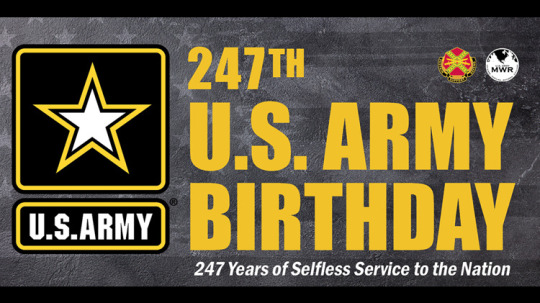

Happy 247th, Army!
HOOAH!
5 notes
·
View notes
Text
A lot of my collecting of WWII stuff was inspired by Medal of Honor: Frontline. I was playing it one day the summer I had my first job and I wondered while playing how hard it would be to find a helmet from WWII.
After acquiring said helmet, I set about putting together the uniform of this little knockoff G.I. Joe I had bought when I was a freshman in High School, dubbed "pocket Jimmy Patterson"

Pocket Jimmy Patterson there is a Sergeant in the 101st and was sold as a D-Day soldier but he's actually dressed for Market Garden.
I landed on paratroopers in part because of pocket Jimmy Patterson, and in part because I like airplanes. From there, I went with the 101st over the 82nd because I already thought they had the best patch, I liked the playing card insignia painted on the side of the helmet, the number 101 is aesthetically pleasing, and I didn't know about any other airborne units.
I mean,
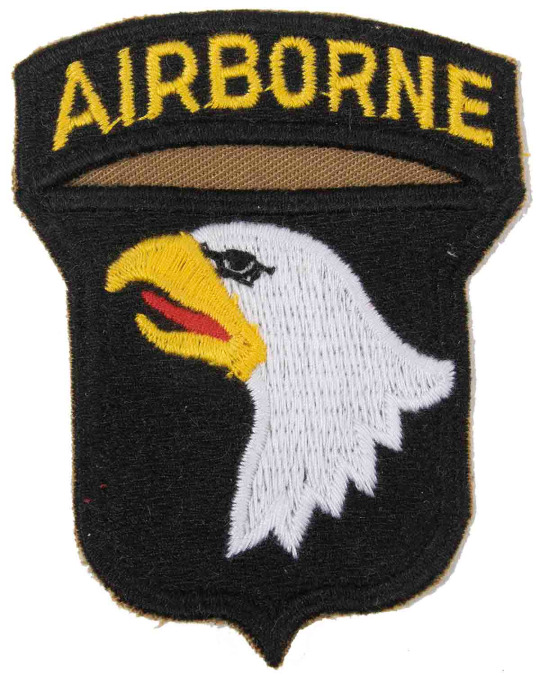

Come on.
(the 101st is the one on the left, and the 82nd on the right, if you didn't already know)
I say all that because if you know anything about WWII collecting and especially re-enacting you know that elite units are dramatically over-represented and for the U.S. nobody more than the 101st, and this can be blamed almost exclusively on Band of Brothers, a show I had not even seen when I landed on the 101st.
How bad is it?
Well, by way of illustration, as a stress response to the final stages of my dissertation I've been retreating into buying WWII paratrooper stuff again, and I was questioning whether I hadn't better go with another unit this time. I had a great great uncle killed in the Philippines in WWII who was in the 11th Airborne so that's an obvious candidate, but of course if you want to stick to Europe and fighting Nazis your options are the 82nd, 101st, or 17th. Of those, the 17th only really got into the war in 1945 and if you want to do Normandy, as some 90% of re-enactments do, then you're between the 82nd and the 101st.
The 82nd has a much longer history than the 101st and, objectively, and I mean this with all implied asterisks and am speaking as though I were a twelve year old who does not know better, the 82nd is cooler, the inferior number/patch notwithstanding.
So I was on a website that is well-regarded for selling WWII militaria and they have a section for patches and I was doing some comparison of original WWII-era divisional patches. The cheapest 101st Airborne patch from WWII this guy has for sale is $175, most of them hovering closer to $300, and some in the $600 range.
11th, 17th, and 82nd patches are in the $50 range.
When I still did re-enacting as the 101st, I remember talking to some of the guys who were disappointed with the rather low "authenticity" standards of our unit (always something of a joke when a considerable number of G.I. re-enactors are in their 40s-60s and dramatically overweight), especially considering that the 101st Airborne are one of the most cartoonishly over-documented units in WWII, for whom reproductions of everything are widely available, and so there's really no excuse not to have your uniform and equipment more or less 100% correct.
Sure enough, trying to do a little research into the 82nd to see what that pool would be like, the resources are shockingly slim. The 101st had two combat jumps in WWII, Normandy and Holland. The 82nd jumped into Sicily, Salerno, Normandy, southern France, and Holland. They have a much longer combat record and are, comparatively speaking, almost totally neglected by idiots like me who are into WWII.
Even as I say all this
I am having a hard time severing the internal connection to 101
#wwii#ww2#re-enacting#my militaria#you know#I never actually pieced together the full Pocket Jimmy Patterson uniform#I never got that M8 scabbard#never got the wire cutters#never got a Thompson#and I never got that shoulder bag#the rest of the stuff I did acquire#at this moment the only stuff on him that I have is the 1911 the helmet the scarf the belt the flag brassard the 1911 mag pouch and#ironically perhaps#that M8 scabbard#I think if I focused on the 82nd I'd try to do the 505th because there's a picture of a guy from the 505th with an M1903A4 before Italy#also they had a rampant lion (panther?) painted on the side of the helmet for Italy#not for Normandy I don't think#the 509 are also cool but they're an independent regiment
17 notes
·
View notes
Text
Hard decisions // Ron Speirs x Reader
Summary: A breakup is always hard. No matter if you are the one breaking up or if you are the one who someone else is breaking up with. To make the decision to break someone's heart you loved will always break your own. The best comfort you have, either way, is love.
Warnings: Angst, Break-up letter, Watch out for the feelings, insecurities, guilty conscience.
A/N: This is for you, @brassknucklespeirs! I hope it will cheer you up a little!
Tagging: @brassknucklespeirs, @lieutenant-speirs, @softguarnere, @liebgotts-lovergirl, @hxad-ovxr-hxart
(Some of you told me that you want to be tagged in these kinds of things, so... here you go! If you want me to stop, just tell me ;) )

February 12, 1945 - Haguenau, France
Thinking, you sit in front of the blank paper on the table in front of you. For what feels like an eternity, you have been sitting there trying to put down on paper the words that have been haunting your mind since Nuenen. Probably even longer, if you're honest.
Since your company has lost so many men, you've become increasingly aware. More aware that it could hit you at any moment.
At home, your fiancé is waiting for you. He didn't have to serve in the war because he helped build warships in New York before the war. You were just in your last year of medical school when the U.S. entered the war.
That was also why they quickly brought you to one of the military camps to help train Combat Medics. Most recently, you were at Camp Toccoa with the paratroopers, where Colonel Sink took notice of you. Seeing the best company to date already in front of him, he immediately wanted to recruit you for Easy.
Your fiancé, of course, at first was far from enthusiastic about the idea of you going to war, but eventually, he took your wish into account. As he always has.
If he didn't read your wishes from your lip, then all you had to do was say the word, and he did what was in his power to make you happy.
And now you're sitting here. In front of the blank paper, somehow trying to come up with a phrase to break the heart of the kindest, sweetest man in the world.
Sighing, you take the pen in your hand and start writing.
My dearest love,
As I write, I already feel that I will regret this letter forever. You brought me joy like no man ever could when I needed it most. You brought out the best in me by simply being you. Your love has lifted me to the most incredible heights imaginable.
Nothing in life is predictable - not even love. What you feel for someone today may not be the same tomorrow. I am saying this as I think my feelings for you have gone through something similar. I don't feel the same for you as I did when we started dating. I don't know why this has happened, but I think I should be frank and honest with you.
I can't stay in a relationship where there is no love. I hope you're able to move on and meet someone who will love you the way you deserve to be loved.
It would be unfair to you if I let it continue this way. You certainly deserve someone who loves you wholeheartedly. Hence, I feel I need to be honest with myself and you and let go of our relationship.
I am deeply hurt, and my heart will undoubtedly be scarred because we can't be together. I am willing to suffer this pain because I know you will be happy in your new life. But I have to let you go and end this relationship even though doing so feels like stabbing my own heart. I have to let you go so we are both free to move on with our lives.
It is a heartbreaking decision I am making. I hope we can remain friends, and I hope you agree that this is the best decision for both of us.
Thank you for coming into my life and filling it with so much love. I hope, someday, in another universe, we meet sooner and in favorable circumstances.
With all the love,
Y/N
As you write the last words, tears run down your cheeks. You quickly wipe them away before leaning back in your chair and rubbing your face. It almost tears your heart, but you can't help it. Your feelings are not the same as they once were.
With a heavy heart, you make your way to Vest to bring him the letter. Your hands holding the envelope are shaking, and your eyes are still burning.
"Corporal!" you hear someone call out before you turn around. "Sir?" you ask back, and Speirs approaches you. Your heart begins to beat faster. However, you can't tell if it's because the captain is getting closer to you or because you're nervous that he'll notice you're not doing well.
Quickly, you wipe your eyes again with your sleeve.
"Is everything all right, Y/L/N?" asks Speirs, and you nod. Maybe a little too quickly because he raises an eyebrow. "I - I just wanted to take this letter to - um Vest." Speirs eyes you. Your eyes glaze over, and your hands shake more violently again.
"For your folks?" he asks before you press your lips together. "In - in a way, yeah."
You stand there for another moment, neither of you saying anything. "Well, come on, then. I'll walk with you." Surprised, you look at him. "Sir?" Speirs says nothing but starts to leave, and you quickly follow him.
When you arrive at Vest, he smiles at you as he always does. "Y/N, good to see you. Do you have something for me?"
You just stand there, letter in hand, staring at it. "Y/N?" Vest picks up again, exchanging a questioning look with Speirs, who is also eyeing you. But you are still nervously kneading the letter in your hands. Suddenly you feel a hand on your shoulder and jerk your head up. "Y/N?" now Speirs asks, looking you in the eyes and then at the letter in your hands.
You meet his gaze as he carefully takes the letter from your hands and hands it to Vest without breaking eye contact with you. Then he grabs your upper arm. "Come," he whispers, pulling you along with him.
You ask no questions as Speirs leads you out of the house, into another, then up two flights of stairs and into an abandoned apartment. At the top, he lets go of you, and you take a quick look around the room.
"What's going on with you?" Speirs then asks, looking at you as you walk over to the window and stare out. At first, you say nothing.
"I just did something that - wasn't easy." You turn to Speirs and look at him. "I - I ended it. With my fiancé," you add. Speirs still says nothing but looks at you.
Tears well up in your eyes. "I - I couldn't go on. Not like that. That - that wouldn't be fair to him, and he's so -" your words break off, and you sob.
"Hey, hey," Speirs says softly, coming over to you and taking you in his arms. "It's okay, you hear?" He gently strokes your back. You rest your head on his shoulder. "It's not," you whisper, "He's too good, and I..." You push away from him. "I've fallen in love with someone else."
You take a few steps away from Ron. "Y/N, we can't always help our feelings. How long has it been since you've seen your fiancé? Two years?" Now you look at him again. "It doesn't matter, Ron. I promised him I would. I promised him I'd come home to him and marry him; instead, here I am, breaking his heart. Jesus!" You ruffle your hair in despair.
"You have a guilty conscience," Ron says, stepping up to you again. You feel his breath on your face. "That's understandable, but you need to know that two years is a long time, and a lot can happen, Y/N. And no matter what you do, it always hurts." You look into his blue eyes.
Then you lean in and kiss Ron. It only takes a few milliseconds for his hands to be on your neck, and he deepens the kiss. As you pull away from each other, Ron rests his forehead against yours.
"It was never my intention to put you in this situation, Y/N. I hope you know that" he whispers, and you close your eyes briefly. Then you nod slightly. "Like I said, we can't control our feelings. You had feelings for me even though you were engaged, and I had feelings for you even though it's forbidden, let alone since I'm your superior. And yet, I believe that love is a beautiful thing, Y/N. And we should embrace it. In these dark times anyway."
Ron takes your hand in his. "You don't know how much I love you, Y/N. And it hurts me to see you like this." He takes your hands in his. "You know," you say softly. "In the beginning - in the beginning, I thought it would go away. That I'd get a handle on my feelings. But I realized more and more that that probably wasn't true."
You look Ron in the eye. "You've shown me what I need and what I'm missing, Ron." Then you put a hand to his cheek. "I need you, and I love you." You lean in again and kiss Ron. "Thank you for being there for me."
"I'll always be here for you. Even if you would have chosen differently, my love. I would have accepted it, but you are too important to me not to have you in my life anymore. I love you more than anything in this world."
Tears come to your eyes again. Ron wipes them away with his thumb. "Don't cry, darling. It all gets easier with time, believe me. He'll get over it, too, Y/N, and find someone who loves him just as much. Don't worry too much, okay?"
He strokes my arms comfortingly. A smile creeps onto your face, even though you're still crying. "Thank you, Ron. That's what I needed to hear." "Sometimes you just need the right person, with the right words."
One more time, you put your lips to his. "I love you." He tenderly caresses your cheek. "And I love you."
#Band of Brothers#Ron Speirs x Reader#Ron Speirs#Ronald Speirs#Band of Brothers Oneshot#bobedit#hbo war#hbo series#bob#Matthew Settle#Matt Settle#Ronald Speirs x Reader#Ron Speirs fanfic
76 notes
·
View notes
Text
The Caribbean entered modern history “as the pawn of European power politics, the cockpit of Europe, the arena of Europe’s wars hot and cold,” wrote Eric Williams almost a half century ago [...]. Indeed, Shalini Puri and Lara Putnam argue that military operations and the political culture of militarism make for the coherence of the region [...].
Certain zones -- including Guantánamo, the subject of the collection by Don E. Walicek and Jessica Adams -- have borne special, enduring burdens in this regard. [...] The Caribbean moved into the twentieth century on a major martial note. In 1898 the United States intervened into the armed Cuban anticolonial struggle against Spain, [...] and taking on the imaginary white man’s burden. For North Americans, the many consequences of this speedy and “splendid” war included the appropriation of Cuba’s Guantánamo Bay (1903) for use as the republic’s first overseas naval base. [...] Diana Coleman, for example, locates the symbolic significance of the base and prison in a deeper past, a history that goes back to the 1893 Columbian Exposition in Chicago. [...] Walicek’s essay establishes that the very embeddedness of Guantánamo in an imperial past has been erased by official discourse. He notes that even before the post-9/11 war on terror, Haitians and Cubans seeking asylum found themselves detained in Gitmo. [...] Examining visual representations, Esther Whitfield emphasizes the struggle of local artists to show Gitmo, against the cliché as a “no man’s land,” to be a place inhabited by people. [...] The greatest physical expansion of Gitmo came during World War II, a period of profound militarization across the Caribbean [...]. Also set in wartime Trinidad, Rita Pemberton’s essay plays up the paradox of food scarcity and insecurity in the midst of Yankee-sponsored prosperity. [...]
---
Meanwhile twenty-first-century Caribbeans have had to deal with a nominally novel form of warfare, the U.S.-led “War on Drugs.” This campaign, Deborah Thomas recounts, pushed Jamaican security forces to invade the Kingston community of Tivoli [...]. How residents have remembered this “Tivoli Incursion” and how their memories expose doubtful feelings about sovereignty in Jamaica is Thomas’s central concern. [...]
Grace Johnson focuses on the early twentieth-century U.S. occupation of Haiti, stressing [...] the way these women played a central role in the protests that eventually led to the end of the occupation. [...]
Vieques also serves as the setting for Daniel Arbino’s piece on the violent history of the U.S. military presence and the protests that led to the demilitarization of the little island in 2004.
Don Walicek brings awareness to the landing of British paratroopers and marines in Anguilla in 1969 after leaders on the island declared “independence” from St. Kitts and Nevis. Little known outside of Anguilla, this British Invasion (“Operation Sheepskin”) reminds us that in the age of decolonization tiny Caribbean societies too were caught up in militant struggles for self-government. Unlike the case of Anguilla, the U.S. invasion of Grenada in 1984 has been the subject of numerous studies [...]
---.
Two other essays concerned with Trinidad also center on music.
Jocelyne Guilbault insightfully links the anxiety about armed violence to the increasing use of militarized policing at the large soca “fetes” that define the island’s Carnival season.
And Louis Regis (recently passed) turns away from the insecurity of soca fetes and toward the texts of songs to examine the treatment of military issues in calypso and soca across the twentieth century. Dealing with a massive discography, Regis stresses a range of themes, showing how lyrics have moved from warning women about predatory policemen, to condemning the U.S. invasion of Grenada and pleading for peace. [...]
---
Text by: Harvey R. Neptune. “A Force in the Field: Recent Interventions into the Military History of the Caribbean.” New West Indian Guide. Online publication date 3 June 2020. [Bold emphasis and some paragraph breaks/contractions added by me.]
#caribbean#abolition#tidalectics#archipelagic thinking#indigenous#ecologies#geographic imaginaries#haunted
21 notes
·
View notes